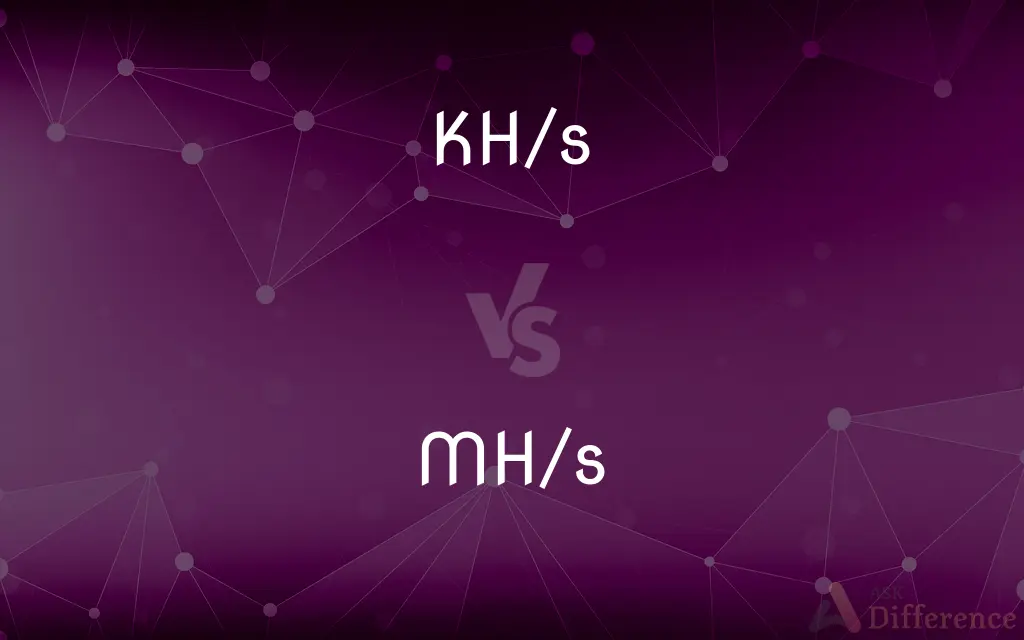KH/s vs. MH/s — What's the Difference?
By Tayyaba Rehman & Fiza Rafique — Published on February 2, 2024
KH/s (KiloHashes per second) and MH/s (MegaHashes per second) measure mining speed, with 1 MH/s being 1,000 times faster than 1 KH/s.

Difference Between KH/s and MH/s
Table of Contents
ADVERTISEMENT
Key Differences
KH/s stands for KiloHashes per second, a unit measuring the computational speed of cryptocurrency mining or data processing, indicating thousands of hash calculations per second. MH/s, or MegaHashes per second, represents millions of hashes per second, offering a higher processing capability.
Devices operating at KH/s are generally considered slower or less powerful in the context of current cryptocurrency mining standards. MH/s indicates a significantly higher level of performance, suitable for more intensive mining tasks and applications requiring substantial computational resources.
Mining efficiency in KH/s might be adequate for less complex algorithms or earlier stages of a blockchain but tends to be insufficient as the network grows. MH/s denotes a more efficient mining operation, capable of handling more complex calculations and competing more effectively for block rewards.
The shift from KH/s to MH/s in mining equipment represents technological progress, with newer devices boasting greater efficiency and speed. This evolution reflects the increasing difficulty levels in blockchain networks and the need for more powerful hardware.
While KH/s might still be relevant for certain low-power applications or beginner mining setups, MH/s is a benchmark for professional and industrial mining operations, aligning with the demands of contemporary blockchain networks.
ADVERTISEMENT
Comparison Chart
Speed
Thousands of hashes per second
Millions of hashes per second
Mining Capability
Suitable for less complex algorithms
Required for competitive mining
Hardware Power
Lower-end mining devices
High-performance mining rigs
Technological Era
Early blockchain technology
Modern, advanced blockchain technology
Efficiency
Lower
Higher
Compare with Definitions
KH/s
Reflects the computational capacity of early-generation mining hardware.
Vintage mining equipment was typically rated in KH/s due to its limited processing power.
MH/s
Measures millions of hash calculations per second, indicating high mining speed.
Modern mining rigs can achieve speeds of 30 MH/s or more, vastly outperforming older models.
KH/s
Suitable for mining on less complex blockchain networks.
For hobbyist mining on smaller networks, a few KH/s might still be viable.
MH/s
Essential for efficiency in current blockchain networks.
Mining Ethereum effectively requires a setup that can deliver at least 25 MH/s.
KH/s
Measures the efficiency of small-scale or beginner mining setups.
His beginner mining setup clocks in at around 800 KH/s, which is decent for learning.
MH/s
Represents the capability of advanced mining hardware.
High-end GPUs can deliver mining speeds in the range of several hundred MH/s.
KH/s
Indicator of low to moderate mining speed.
Entry-level miners often start with machines operating in the KH/s range.
MH/s
Indicator of a professional or industrial-grade mining operation.
Their industrial mining farm is equipped with machines that run at thousands of MH/s.
KH/s
Unit measuring thousands of hash calculations per second in mining.
My old mining rig only manages about 500 KH/s, which is quite slow today.
MH/s
Standard unit for competitive cryptocurrency mining.
To stand a chance in today's mining landscape, you need equipment that operates in MH/s.
Common Curiosities
What does KH/s stand for?
KH/s stands for KiloHashes per second, indicating thousands of hash calculations per second.
Is MH/s better than KH/s for mining?
Yes, MH/s indicates a faster hash rate, making it more suitable for efficient mining.
What does MH/s mean?
MH/s means MegaHashes per second, representing millions of hash calculations per second.
What kind of mining can I do with KH/s?
KH/s may be suitable for mining less popular or new cryptocurrencies with lower difficulty.
Why have miners moved from KH/s to MH/s?
The increasing difficulty of mining algorithms and competition among miners necessitates more powerful hardware.
What hardware typically operates in MH/s?
Modern GPUs and specialized ASIC miners typically operate in the MH/s range.
How many KH/s are in 1 MH/s?
1 MH/s is equal to 1,000 KH/s.
What's the future of mining speeds beyond MH/s?
With technological advancements, mining speeds are reaching GH/s (GigaHashes per second) and beyond.
Can I mine Bitcoin with a device that runs at KH/s?
Technically, yes, but it would be highly inefficient given Bitcoin's current difficulty level.
Are MH/s units used only in cryptocurrency mining?
Primarily, yes, though they can also apply to other computational tasks requiring hash calculations.
Do all cryptocurrencies require MH/s for mining?
Not all, but most competitive and popular cryptocurrencies require high hash rates for profitable mining.
What affects a miner's hash rate in KH/s or MH/s?
The miner's hardware performance, efficiency, and the algorithm being mined.
How do I calculate my mining earnings from MH/s?
Use a mining calculator, inputting your hash rate (MH/s), power consumption, and electricity cost.
Can I upgrade my KH/s device to MH/s?
Hardware capabilities are fixed, so upgrading would require purchasing new, more powerful equipment.
Is it cost-effective to mine with KH/s?
Generally, no, due to lower efficiency and higher electricity costs relative to the potential mining rewards.
Share Your Discovery

Previous Comparison
RIP vs. OSPF
Next Comparison
Korean Face Shape vs. Japanese Face ShapeAuthor Spotlight
Written by
Tayyaba RehmanTayyaba Rehman is a distinguished writer, currently serving as a primary contributor to askdifference.com. As a researcher in semantics and etymology, Tayyaba's passion for the complexity of languages and their distinctions has found a perfect home on the platform. Tayyaba delves into the intricacies of language, distinguishing between commonly confused words and phrases, thereby providing clarity for readers worldwide.
Co-written by
Fiza RafiqueFiza Rafique is a skilled content writer at AskDifference.com, where she meticulously refines and enhances written pieces. Drawing from her vast editorial expertise, Fiza ensures clarity, accuracy, and precision in every article. Passionate about language, she continually seeks to elevate the quality of content for readers worldwide.














































